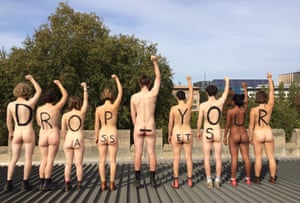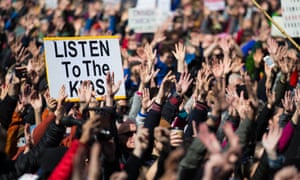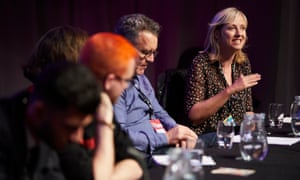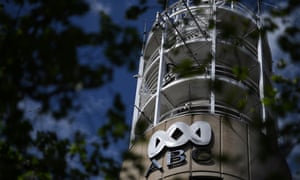Younger activists may not follow the same path as their elders but they are engaged and taking action in their own way
Every
generation of old codgers thinks its society’s youth are feckless
layabouts who will send the world to hell in a handbasket. Socrates
complained that ancient Greek children loved luxury, and had terrible
manners and contempt for authority. In the 1920s, parents feared their
offspring would turn into immodest flappers and risky partygoers. In the
1960s, when large numbers of students and young people drove the new
civil rights, feminist, peace and environment movements, they sent the
older generation into a panic. Youth had “gone wild”. Teenagers were
“sex-obsessed”, while protestors were nothing better than rioting
criminals. It’s inevitable, then, that millennials cop criticism, but
it’s not justified.
A much-discussed 2013 Time cover bears the memorable line “Millennials are lazy, entitled narcissists who still live with their parents.” The inside story, penned by a Gen Xer, told of “a crisis of unmet expectations” for kids born between 1981 and 2000, thanks to their being raised on a diet of constant praise and affirmation: “Though they’re cocky about their place in the world, millennials are also stunted, having prolonged a life stage between teenager and adult.”
Please. It is not bruised egos that disappoint this generation; it’s the fact that the last lot failed to clean up after themselves and the planet’s conking out.
“No one agrees about what makes each generation unique. For instance, are young people today narcissistic and coddled, or are we creative and energetic?’ writes sixteen-year-old Logan Casey, with impressive maturity, in The New York Times. “Generalizations snowball and millions of people are made to share one identity. These stereotypes can reinforce prejudices and make groups into easy scapegoats.”
I work with students all the time, and I’ve never met a single one who didn’t care about global warming or social justice or trying to build a better future. While millennials are indeed a large and diverse demographic, studies show how they value authenticity and transparency, and are more likely to be recyclers and conscious consumers. Coming of age in the Anthropocene, they exist online in a way that their parents did not. Add these ingredients to the pot and stir, and you get a very different dish from the one served up by Time magazine.
"Maybe I was just ready to hear it, but it clicked: We’ve been lied to. Our future is not secure."
The Millennial Impact Project runs an annual survey that since 2009 has quizzed over 100,000 American millennials on their attitudes to civic engagement, showing how this generation is combining social media with traditional forms of participation, while “redefining terms long accepted in the cause and philanthropy space: Activist. Cause. Social issue. Ideology.”
The 2017 report concludes that their interest in the greater good is driving their cause engagement today, and their activism (or whatever you want to call it) is increasing. Gens Y and Z are the most globally connected ever – they are building community online. They may well be induced to march; they might even sue the government for its failure to protect their right to a healthy environment. But it starts, builds and evolves with social media. Older people trying to figure out what makes Gen Z tick (and how to sell to them) have noticed that they regard equality as a non-negotiable, and are getting involved in social activism at a much earlier stage in life. Forbes hints that it’s the Malala effect.
As one young journalism student puts it in a piece for Odyssey online, “Millennials have developed our own activist platform. Homophobia, racism, cultural appropriation, transphobia, negative body image, police brutality, gun control, and women’s reproductive rights are some of the social and political issues that affect our lives, and we are willing to fight for them to great lengths until national action is taken.”
Macpherson-Rice answered American environmentalist Bill McKibben’s call to join the divestment movement as soon as she heard it. She’s read all his books and volunteers for 350.org, the global climate action organisation he founded in 2007. The composting “was just something we did during lunch breaks. I’m not sure I can honestly tell you I cared deeply about it.” The caring bit came later. She’d just arrived at university and was taking international studies. “I always thought I would grow up, get a great job and travel the world. That’s how I imagined my life playing out,” she says.
A lecture threw that dream into sharp relief by describing how our warmed world might look by the end of the century, with refugees rather than gap-year backpackers on the move, forced from their scorched homelands by desertification and sea level rise. “It was something in the way that the lecturer explained it,” says Macpherson-Rice, “or maybe I was just ready to hear it, but it clicked: We’ve been lied to. Our future is not secure. It will most likely be characterised by climate disaster, worsening social problems and more extreme weather.”
She switched courses to study environmental humanities at the University of New South Wales, only to find the institution had investments tied up in the fossil-fuel industry. “It was during orientation week; I got chatting to these kids from Fossil Free UNSW. I was horrified.” She signed up and was soon made campaign co-ordinator.

A much-discussed 2013 Time cover bears the memorable line “Millennials are lazy, entitled narcissists who still live with their parents.” The inside story, penned by a Gen Xer, told of “a crisis of unmet expectations” for kids born between 1981 and 2000, thanks to their being raised on a diet of constant praise and affirmation: “Though they’re cocky about their place in the world, millennials are also stunted, having prolonged a life stage between teenager and adult.”
Please. It is not bruised egos that disappoint this generation; it’s the fact that the last lot failed to clean up after themselves and the planet’s conking out.
“No one agrees about what makes each generation unique. For instance, are young people today narcissistic and coddled, or are we creative and energetic?’ writes sixteen-year-old Logan Casey, with impressive maturity, in The New York Times. “Generalizations snowball and millions of people are made to share one identity. These stereotypes can reinforce prejudices and make groups into easy scapegoats.”
I work with students all the time, and I’ve never met a single one who didn’t care about global warming or social justice or trying to build a better future. While millennials are indeed a large and diverse demographic, studies show how they value authenticity and transparency, and are more likely to be recyclers and conscious consumers. Coming of age in the Anthropocene, they exist online in a way that their parents did not. Add these ingredients to the pot and stir, and you get a very different dish from the one served up by Time magazine.
"Maybe I was just ready to hear it, but it clicked: We’ve been lied to. Our future is not secure."
The Millennial Impact Project runs an annual survey that since 2009 has quizzed over 100,000 American millennials on their attitudes to civic engagement, showing how this generation is combining social media with traditional forms of participation, while “redefining terms long accepted in the cause and philanthropy space: Activist. Cause. Social issue. Ideology.”
The 2017 report concludes that their interest in the greater good is driving their cause engagement today, and their activism (or whatever you want to call it) is increasing. Gens Y and Z are the most globally connected ever – they are building community online. They may well be induced to march; they might even sue the government for its failure to protect their right to a healthy environment. But it starts, builds and evolves with social media. Older people trying to figure out what makes Gen Z tick (and how to sell to them) have noticed that they regard equality as a non-negotiable, and are getting involved in social activism at a much earlier stage in life. Forbes hints that it’s the Malala effect.
As one young journalism student puts it in a piece for Odyssey online, “Millennials have developed our own activist platform. Homophobia, racism, cultural appropriation, transphobia, negative body image, police brutality, gun control, and women’s reproductive rights are some of the social and political issues that affect our lives, and we are willing to fight for them to great lengths until national action is taken.”
When the system lets you down
Students Liz Morley, twenty-one, and Breana Macpherson-Rice, twenty-three, are trying to explain the origins of their climate-change activism. Digging around for her earliest eco experience, Macpherson-Rice comes up with, “I was part of the compost team at school,” then adds, “I didn’t start it,” lest I give her credit where it’s not due. They are scrupulously honest; it’s a matter of principal, because those they oppose deal in half-truths and outright lies.Macpherson-Rice answered American environmentalist Bill McKibben’s call to join the divestment movement as soon as she heard it. She’s read all his books and volunteers for 350.org, the global climate action organisation he founded in 2007. The composting “was just something we did during lunch breaks. I’m not sure I can honestly tell you I cared deeply about it.” The caring bit came later. She’d just arrived at university and was taking international studies. “I always thought I would grow up, get a great job and travel the world. That’s how I imagined my life playing out,” she says.
A lecture threw that dream into sharp relief by describing how our warmed world might look by the end of the century, with refugees rather than gap-year backpackers on the move, forced from their scorched homelands by desertification and sea level rise. “It was something in the way that the lecturer explained it,” says Macpherson-Rice, “or maybe I was just ready to hear it, but it clicked: We’ve been lied to. Our future is not secure. It will most likely be characterised by climate disaster, worsening social problems and more extreme weather.”
She switched courses to study environmental humanities at the University of New South Wales, only to find the institution had investments tied up in the fossil-fuel industry. “It was during orientation week; I got chatting to these kids from Fossil Free UNSW. I was horrified.” She signed up and was soon made campaign co-ordinator.

Elizabeth Morley was acutely aware of the environment as a child growing up during Australia’s millennium drought. The nightly news told of farmer suicides and reservoirs drying up. “I was obsessed with saving water,” she says. “I worried that the country would run out and we’d all die.”
She was still in primary school when she watched An Inconvenient Truth. “I was very upset by it. I thought the world was going to end, but in high school I kind of forgot. Everything around me seemed fine.”
The teenaged Morley figured there was nothing to see here “around the time that the carbon tax was being introduced in Australia. I felt like the government was acting and scientists were being listened to; that they had this thing under control.” But Morley had a wake-up call. One minute you’re just a kid, happily trusting that the old people are acting responsibly; the next, you grow up. Fast.
Carbon pricing was introduced in 2011 with the Gillard Labor government’s Clean Energy Act, but repealed in 2014 by Tony Abbott (the Liberal–National Coalition accepted at least $1.8 million in direct donations from mining and energy companies that year). Australia did sign the Paris agreement, committing “to taking strong domestic and international action on climate change” and reducing emissions, but guess what happened the following year? Emissions rose.
I ask Morley if she was paying attention to politics again when the carbon tax was killed, and she says, “Of course,” and I ask her how she felt, and she says, “Angry. The injustice really got to me. They knew it would lead to where we are today, the path was clearly set, but they decided to keep going because it made them richer.”
I ask her who she means by “they” and she says, “Our politicians, on both sides, who do not act in our best interest, but profit at our expense; and the fossil-fuel industry, and everyone who gets paid by them.”
The year of the Paris agreement was also the year Morley read This Changes Everything by McKibben’s great collaborator, Naomi Klein. She was in her second year at UNSW, majoring in Japanese. “Naomi Klein’s book was the big turning point for me in my adult life; like, god, our future is not secure. Our lives are not going to be like our parents’ lives were. I can’t have these assumptions that we’ll grow old in a world that’s safe and familiar to us, like previous generations did.”
She, too, switched courses (to environmental humanities and economics) and now talks about the urgent need “to dismantle the power dynamics that exist in perpetuating the use of fossil fuels”. All she needs is a beret. Don’t get the wrong impression; these women aren’t dangerous revolutionaries. They are mild-mannered, open, friendly and considered. Diligent students. When contemplating arrest as they planned their 36-hour occupation of UNSW’s council chamber in 2016, they were confident that their exemplary academic records would work in their favour should the police be called in. “We are the kids who get good grades,” says Morley.
"They knew it would lead to where we are today, but they decided to keep going because it made them richer."
The sit-in was a last resort. They’d tried asking nicely. Their requests for meetings with the Vice Chancellor were repeatedly knocked back, even after they’d surveyed 1,300 students and found that 78% supported divestment. “We got nowhere,” says Macpherson-Rice. “So we collected signatures for an open letter. We got staff and academics on board. We presented it to the Vice Chancellor, but within a couple of weeks he’d made his response.” It was no. “We finally decided to take the route of the ‘hard’ tactic,” says Morley. “Direct action.”
The sit-in was part of a national day of student climate action. In Victoria, arts major Aoife Nicklason was one of nine students who clambered, naked, onto the roof of the University of Melbourne’s storied Old Quad building, with a message painted on their bums: “Drop your assets”. They guessed right that “the internet’s obsession with butts” should guarantee news coverage. Most memorable headline? “Melbourne University students get high, naked.” Nicklason wrote for a student news site, “For our voices to reach as many people as possible, our activism must be as diverse as possible. So write a letter to the editor, tweet about it, make a YouTube video, talk to your mum, do some performance art.”
Beware, though: mums don’t always understand. One Mother’s Day, Macpherson-Rice did not get home for lunch. Instead, she put her war paint on – a red cross on each cheek – climbed into a white hazmat suit and joined a blockade of the Sandgate Bridge on the Newcastle coal rail line. The protestors sang and ate hummus as the police removed them one by one, charging them with trespassing.
That same day, a flotilla of several hundred activists in kayaks blockaded Newcastle harbour. The chant? “We are unstoppable! Another world is possible!”
I ask Macpherson-Rice if her parents were mad at her for getting arrested.
“Mum was just really worried about my future,” she says. “I get it, but …”
“This is more important?”
She shifts in her seat and moves her elbow onto the table, revealing a tattoo of the number 355 on her outer wrist. It’s a “birthmark” tattoo representing C02 as parts per million in the atmosphere the year she was born. She sees me see it, and smiles. “We used data from Tasmania so it’s a bit different from other people’s.”
Parts per million recordings began in the southern hemisphere at Cape Grim on the north-western tip of Tasmania in 1976, the year I was born. If I were the tattoo type, my ink would read 329. Measurements are always slightly lower here than in the northern hemisphere, because there is less land mass (hence less population and industrial activity), and the ocean – a carbon sink – covers a larger area. “The tattoo means a lot to me,” says Macpherson-Rice. “It’s a reminder, a constant one, and also a conversation starter.”
“I remember you saying you got it on that side of your arm so you’re not always having to look at it; otherwise you can’t escape it,” says Morley. “Yeah but mostly it’s so other people see it. My cousin was like, ‘What that’s about?’ and when I explained, he said, ‘What’s the ppm thing now?’ So I told him, ‘Now it’s 403. Time is running out.’”
- This is an edited extract of Rise & Resist: How to change the world by Clare Press (Melbourne University Press, $32.99)





29.53% of applicants gained access to the Disability Support Pension last financial year. The government wants you to consider this a win. But cutting access to the DSP doesn’t mean those who’ve been rejected are working. It means they’re on Newstart, an allowance that’s fundamentally unable to support those with disability or chronic illness.
"I cried as I walked home. It wouldn’t be the last time."
I have endometriosis. You might have heard of it, particularly with the recent publication of the national action plan for endometriosis. I share the condition with around 700,000 Australians but symptoms vary. Some with endo live relatively functional lives. Others, like me, have a landmine go off in our pelvis that takes our whole body down with it.
If you’re on Newstart while you’re sick, you can get an exemption from job search responsibilities until you’re well enough to look for work. It’s a good system, provided you’re not sick for too long. After my first doctor’s certificate expired, I attended an employment-ready assessment where my medical exemption was extended while I worked with doctors to get better.
Only I didn’t get better. Two surgeries, a truckload of medication, and a bank-draining team of medical professionals later, I accepted my new normal. On good days I can write or even leave the house. On bad days I can’t leave my bed. My really bad days are spent on the shower floor trying not to blackout. The biggest barrier to my finding regular work is I never know what kind of day I’ll have in advance. And if I push myself, I risk bad days becoming bad weeks.
Armed with 12 months of documentation and the support of three doctors, I applied for the DSP in August 2017. I was rejected two months later. The rejection gave no specifics but a Centrelink staffer later told me it was because I’d started seeing a pain specialist and therefore my condition wasn’t “fully diagnosed, treated, and stabilised”. I set about appealing the decision.
Then my job search exemption expired. When I enquired about another, I was told I couldn’t get one if my condition was unchanged, even if “unchanged” meant “still sick”. When I asked whether I could submit a doctor’s certificate, I was told Centrelink won’t accept doctor’s certificates for the same condition twice. “Newstart isn’t designed for sick people,” the Centrelink staffer said. If I wasn’t getting better I should apply for the DSP.
I cried as I walked home. It wouldn’t be the last time.
I’m supposed to find work for 7-15 hours a week. When I asked about the sporadic freelance work I do I was told that it didn’t count. I was told that freelance and gig work – often the only work flexible enough for those with chronic illness or disability – often isn’t accepted as “work” by Centrelink. They will, however, record your earnings and reduce your allowance.
That turned out to be wrong information. I’ve since learned my freelance work does meet Centrelink’s requirements to be counted as work. This is far from the first time I’ve been given misinformation. I’ve been sent to the wrong appointments, forced to chase documentation I didn’t need, told I shouldn’t bother submitting paperwork that would help my situation, and – perhaps the worst part – most of the time the misinformation is corroborated by other Centrelink staffers or their affiliates. It’s exhausting.
Meanwhile, my DSP appeal languished for six months before being rejected. When I called the number on the rejection letter, I had a genuinely horrific conversation.
The assessor cited the fact I was on medication to suppress menstruation as evidence my condition wasn’t “fully treated and stabilised”. Period suppression is standard practice for those with endometriosis. It’s not treatment, it’s maintenance. I’ll be on medication to suppress menstruation so long as I have my uterus.
It’s a shame, the assessor continued, that my doctor won’t perform a hysterectomy. I explained that hysterectomies don’t cure endometriosis but my doctor is willing to perform one if I choose because I’m medication resistant and have adenomyosis.
Their response? Because a hysterectomy is on the cards, my condition isn’t “fully treated”. If I appealed further and was successful, I wouldn’t be “allowed” to have a hysterectomy in the next two years. While I was reeling from this, they said unless I’m “running around without knickers and hiding in bushes” then my co-morbid mental illness is also not severe enough to qualify me for the DSP. They didn’t try to assess the impact of my illnesses the way they affect me: cumulatively.
So here I am, living on $650.67 per fortnight (after rent assistance) when my medical expenses alone start at $300 a month (post medicare safety net). I have to find 7-15 hours of work but I have to fight to have my freelancing count toward that number. I don’t qualify for the DSP but Newstart “isn’t designed for sick people”.
And almost one-third of those on Newstart are in my position.
The system is failing those it should be helping. But hey, at least the budget’s looking good.